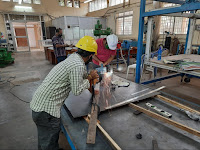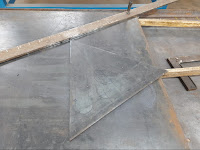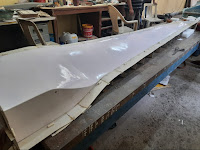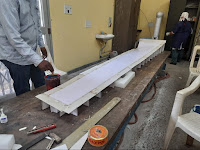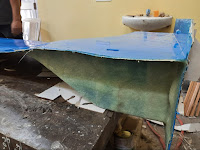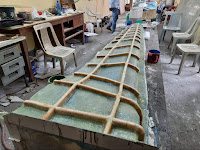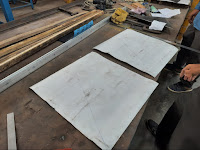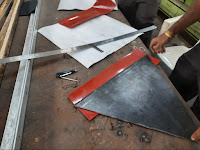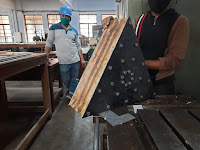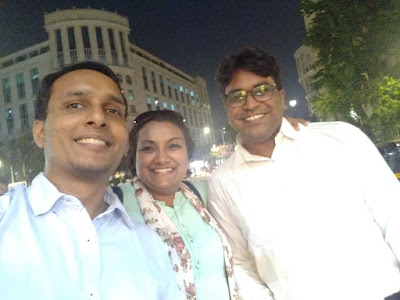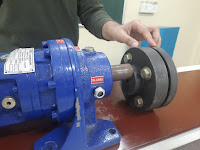The wealth of a nation is determined by its Gross Domestic Product (GDP). It is a big formula as shown below. Here, the total national income is the monetary compensation of the goods and services transacted over a period of time. One can calculate the GDP from a daily basis to a yearly basis. The GDP of a nation is directly proportional to the number of man-hours worked. One man-hour is defined as the amount of work done by a person in one hour (on an average). The more number of people participate in the workforce, the faster the wealth gets generated.
According to the estimates of the World Inequality Report 2022, in India, men earn 82 per cent of the labor income whereas women earn only 18 per cent of it. This means that an average man is richer than an average woman. Let us look at the numbers :
- GDP of India : USD 3.17 trillion (2021).
- Population of India : 1.42 billion (2022)
- Female population of India : 680 million (2022), i.e., 48%.
- Workforce of India = 33% (World Bank Data)
- Female Labour Force Participation = 19% (World Bank Data), i.e., number of working women = 90 million.
- Wealth with women : 18% (USD 0.57 trillion)
- Married women employed : 32% (National Family Health Survey, 2022), i.e. 68% of married women are inside the four walls of the house. (More women are lost to marriage than to war, famine, disease or disaster).
- The un-monetisable "woman-hours" at home need to be limited. In an economy, 'man-hours' are monetisable, 'woman-hours' are not. While men (shrewdly) work only if they are paid for it, women often (stupidly) work for irrespective of the compensation. What she does not realize is that her unpaid labor can be easily done by an outsourced person, who will also be paid for it. Women need to realize how men are taking blatant advantage of her efforts. She cooks and serves, he eats and burps. She makes the bed, he lies on it. She dusts and arranges the sofa, he lounges on it watching TV. She does the laundry, he wears the clothes. She is warming and keeping the nest, he is flying out to new heights. She thinks she is doing all this to show her "love" for her husband / son. N.O. No. Slogging it out at home is not "love". Women have been conditioned to believe that her primary task is to 'support' men in their bread-winning endeavors. If men work for 08 hours a day, why should women work for 16 hours a day? This is where the labor-vs-compensation imbalance starts. (If you live like an assistant, expect an assistant's salary at max).
- Women need to be shrewd and STOP working for free. Women are too emotional to understand the 'game' called economy. Yes, it is a game. You have to know to sell you worth, establish you brand, maneuver your way, and get paid for your efforts. Traditionally, men have been (competitively) distributing the wealth among themselves, exploiting women, and throwing them tit-bits. This continues to keep women poor and powerless. Women need to participate the wealth-generation process to grab a piece of the pie. Jeetna hain to khel ke maidan mein utarna padega. Naukar nahin, maalik banna padega. A woman needs to develop confidence on their abilities and credentials, and should refuse to be easily dismissed or trivialized by men. She needs to stand her ground and hold her own. She should respect their own professional skills and demand an equivalent compensation with utmost confidence. Taking this forward, she needs to start her own source of wealth-generation (job-creator), instead of being a job-seeker before a male employer. (For all of this, she needs to overcome laziness and stop have a joy-ride of patriarchy, i.e., she cannot relax and assume that the husband is supposed to earn the money by default. Instead of being driven around in her husband's car, she needs to drive her own car). Only strength respects strength, competence respects competence, courage respects courage.
- Men need to overcome their domestic handicap. There are enough millennial men who mouth lines on gender equality, yet want to have housewives in their personal lives, and then escapist-ly say 'Oh! it was her own choice to be a homemaker'. Men cannot have a joy-ride on the home front, being couch potatoes and sitting and preening themselves. They need to step in and reduce women's unpaid labor at home, and participate equally in running a house (it is not a hotel-cum-restaurant). They need to get up and look after their own needs, breaking gender stereotypes. Yes, they need to put in effort to look after their food, clothes, home (roti-kapda-makan). They have to stop expecting women to wait upon them and cater to them. Boys need to learn domestic skills from the age of 8. They should know to make their bed, clean their socks and shoes, put their clothes in the washing machine, fold their clothes, arrange their cupboard, put their plates away into the sink, water the plants, etc. From around age 12, sons should learn to make breakfast and snacks (e.g., sandwiches, eggs, cereal, etc.), iron their clothes, run domestic gadgets like washing machine, toaster, mixer/grinder, wash the dishes, dust their own room, clean the washroom porcelain, do pest-control, etc. By age 18, they should know to cook full meals, handle money, and look after the safety of the house. Most importantly, he needs to do all this without being told / reminded / nagged at / coaxed / blackmailed. (This is where the mother's upbringing comes in). Additionally, care-giving and hospitality are important skills to be picked up consciously by men. In this way, they will never need a woman to lean on. (This is exactly the analogy of a woman learning to earn money / drive a car / handle finances, and never to need a man to lean on). The onus of balancing work and home has to be alleviated from women right-away.
- The mother-son equation needs a major upgrade. Mothers, it is high time you raise your sons into independent men. Modern mothers need to stop pampering their sons and reducing them to domestically handicapped overgrown children (Peter Pan syndrome). Mama's boys will be increasingly getting rejected in the marriage market, because women today don't want to adopt a man-child in the name of marriage. The more the mother keeps the son dependent on her, the more he will require a woman (wife) in future to look after him, causing her to compromise on her career. Strategy : Forcefully break this pattern (even risking a temper tantrum). Stop picking up and cleaning up after him, making his bed, washing and ironing his clothes, dressing him up, feeding him, dusting his study table, and looking after his paraphernalia. Stop standing like a waitress as he eats. Stop picking up his thrown clothes/ towel/ socks. Stop reminding him of his next day's schedule and appointments. It is almost an extension of playing with dolls in childhood. Indian mothers often prevent sons from entering the kitchen! Remember when you do something for your son which he sufficiently capable of doing himself, you are denying him the self-esteem of being an independent person. Actually and factually, the mother panders to the son because (usually) she has nothing else to do! No job, no career, no hobbies! (How many of you can name your mom's hobby?) After the son leaves home for college, she suffers from the 'empty nest syndrome'. By then, it is too late for her to re-enter the workforce. She faces an identity crisis, leading to 15% of the total suicides, and 50% of female suicides in India (NCRB Data). Solution : the mother needs to remove her attention away from her son at regular and for increased intervals as the son grows up, and cut the umbilical chord. Stop his joy-ride ASAP. Dear Indian mother, kindly do not delay the adulting of the Indian son : your future daughter-in-law suffers if you raise a man-child. If you make him independent, three generations of women (mother, sister / wife, daughter / daughter-in-law) are spared from spending time and effort looking after him and catering to his domestic needs (for free) : all these women can prioritize their own dreams, ambition and career and start money-making (adding to the GDP). In this way, female talent is not squandered, but is used for building the nation. Men can pick up cues from here.
- Men cannot have the cake and eat it too. Often, a married man is more successful, has a more wholesome life, is more responsible, has a systematic daily routine, has savings, is healthier and is more dedicated; as compared to a bachelor. Marriage is seen to mature a man and anchor his life : the wife is there for constant support and encouragement. The wife is called the 'better half', because she sacrifices at least half of herself to socio-economically prop-up her husband. She is the cook, the cleaner, the attendant, the assistant, the sex-provider, the baby-producer, the culture-upholder, the public-relations-officer. It is commonly said that "Behind every successful men there is a woman". Exactly! A husband always says to his wife, "Mera saath do". Explicitly or implicitly, he is expecting the wife to hang around him 24x7x365 and support him in his domestic and socio-cultural needs, such that he himself can fully focus on his career and money-making endeavors (remember the Anubhav Sinha Thappad movie from 2020?). At the beginning of the day, he expects bed tea, breakfast, clothes, stationery, shoes, etc. to be arranged / fetched by his mother/wife. Once he returns home at the end of the day, he expects the woman to be around to serve him tea, towel, newspaper, dinner. The wife become the free yet solid platform which elevates the man. The subtraction from a woman's value goes and becomes the addition to a man's value. On the path of growth, it is not 1:1 (woman : man), but 0.5 : 1.5, or worse still, 0 : 2 (for housewives). Women think about men, and men think about themselves. Men assume that a woman, by default, will be available, supporting, compromising, sacrificing, adjusting, and can be taken for granted. Men succeed at the cost of women. In the typical Indian family structure, women have no time for themselves. She is always 'on duty', on her toes from morning till night. This is why female health, nutrition, education, mental health are all poor in India. If she thinks about herself, she is labelled "selfish" : patriarchy considers selflessness as a female virtue. Such narratives are nothing but secret strategies to sustain patriarchy. Men destroy female human resources. Period. Why cannot they excel without female domestic support? Why is he so lazy and entitled? Look at the other side of the coin. Who supports women? How many male feminists are around? Behind a woman's success is her own backbone (sometimes the father). Patriarchy is a CURSE! Men need to stop crushing women's careers. Strategy : Please make life easier for women. Men can try taking cues from here. If you prefer women as housewives / working part-time, women will tend to reduce their ambitions in order to get married. Homely, unambitious, family-oriented, part-time working women are far likely to marry early and easily. Matrimonial advertisements show this 'demand'. Hence comes in the 'supply'. Women cut short their careers to become marriageable. "Ladki zyada padh likh jaayegi to ladka milna mushkil hoga". Please see the equation below. Selfish men cost the nation a chunk of the 'missing GDP'. More women in the workforce means a decrease the denominator, and an increase in the numerator; thereby making India a developed country. All developed countries have high female workforce participation rate.
- Women need to toot their own horns. Many women become scared of striving for excellence, lest she outshines her male counterpart and causes him insecurity. Women are intrinsically asked to step back and put the spotlight on the pati parmeshwar. This leaves them under-confident and less self-assured, doubting her abilities to create her own (rightful) place under the sun. Women are very hesitant to talk about their achievements. Girls are told to hide their better grades from brothers. Women declare a lower salary in the marriage market, to prevent suitors from rejecting them. Confident females face the backlash of being perceived as less likable and less hireable by the employers (who are mostly men). A typical women underestimates her abilities and has insufficient courage to project herself as a great candidate in the job market. The society has lapped up this opportunity to constantly remind women that 'she is not good enough' and that 'she should try harder'. Thinking less of themselves and suffering for the Impostor syndrome, she gets stuck under 'glass ceilings'. Instead of believing she really deserves something, she shyly attributes her accomplishment to 'luck', and distributes the credit to others! This is why she is not able to create her brand value. A cocky man, often the husband, can easily cause her to self-doubt herself, indirectly stop her from starting a new job / venture or taking up a new position / assignment / project. Women are exponentially more likely than men to self-blame and self-criticize when thing go wrong, and beat themselves up, further lowering their own self-esteem. They continue to underplay themselves and miss out on that promotion / salary raise / opportunity. That is how her full potential remains underutilized, and the nation's GDP misses out on it.
- Legal age of marriage need to be raised to 30. This will give women sufficient time after college to try different pursuits, make mistakes, find a calling, build a career, collect savings, and have a dwelling; before going the 'family way'. She should get the time to discover herself, fit well into the economy, form her opinions, and take her decisions. Women in India are married before they can understand the world, let alone understand the economy. Unki duniya bahut chhoti reh jaati hain. They tend to adjust their careers based on the marriage prospects, since patrilocality still is present and 97% of the migrations are by women. She is not able to focus on her growth, because at the back of her mind, she knows that her professional graph will abruptly stall the day she marries-and-relocates. Many women keep their career plans on a hold until she gets married, to start on a clean slate. Who pays the opportunity cost? The nation's GDP. For decades, girls have been outperforming boys in schools and colleges, but then have dropped out of the race of earning money. One of the reasons is due to societal pressures of 'marrying off' daughters ASAP. Marriage becomes the end-of-the-road for millions of talented, qualified, and hardworking women. Husbands assume that the wife's career is secondary (her income is simply a supplement to the 'family' income), and that she will eventually quit. Well-qualified women end up in far less-deserving and less-paying jobs, to adjust to the husband's career and move around with (behind) him. Marriage makes women disappear from the workforce and get stuck behind the 'maternal wall'. Women need to stop 'applying for the job' of wife/ daughter-in-law, and auditioning for such free roles. Superior (and paid) jobs / posts / roles can be captured (even created), with just a little ambition, confidence, and perseverance. She cannot be simply a sperm-receptacle. Indian women are already very fertile (fertility rate is 2.06 in 2022) : they have produced huge quantity, but poor quality, population. Where are the Olympic medals, the Nobel Prizes, and the Oscars proportional to the maa-ka-parvarish-kiya-hua population? Smaller countries like Japan and Germany, with far less population, are richer than India : they have an efficient and productive population to create wealth and be prosperous. Strategy : women can pick up cues from here.
- India needs feminist fathers to grow ambitious daughters. It is the father who can prevent the reduction of a female child into a 'woman'. Yes, one is not born but becomes a woman. The mother, as the primary up-bringer, may often end up making the daughter a replica of her, i.e., an assistant to patriarchy. Without the father's intervention and support, the female child will soon descend into becoming like her mother. He needs to lead his daughter(s) in her (their) growing-up years to become a capable human resource, who has received the education and has developed the skill-set to command a price in the economy. The father needs to vigorously monitor the school and college education for their daughters, and simultaneously teach them to be independent and dream big. He needs to explicitly tell them that she needs no one's 'permission' to work; and that there is nothing called "the husband should allow me to work". Women's empowerment begins at home. Instead of limiting her (as compared to a son), the father must stand rock solid behind the daughter's goals and ambitions. As a father, teach your daughter to step out alone, travel alone, handle the maintenance of home gadgets, read books, play sports, drive the two-wheeler/car, handle money and invest it, supervise with home-maintenance staff, manage the security of the home, read the newspaper, open a bank account, run errands, look after her bicycle, be aware of the world around, be updated about the current affairs, learn about study/employment opportunities, etc. (It is unlikely that the mother will teach all this to the daughter). The father must never ever utter phrases like "Bojh", "Paraayaa dhan", "Tum to chali jaaogi", "Tum hamare budhape ka sahaara nahin ban sakti" : this is exactly the opposite of support and encouragement.
- The glorification of motherhood needs to be stopped. Females need to find a calling beyond reproduction. She cannot be born just to give new birth. Then what is she herself? She needs to have a life of her own; instead of simply living for others, catering to their needs, and constantly adjusting to them. Motherhood needs to be a choice, not a compulsion. Dear society, kindly stop asking women 'when are you giving us the good news?'. Women need to create their credibility beyond what the Nature wants them to do. Women get so focused on motherhood and make it their only identity, that it is hard of employers to believe that she can deliver at work. Motherhood should be a part of life, not the whole of it. The employers, the society, and the government all need to step in and and support mothers to return to the economy as soon as possible after having a child. The society needs to systematically and widely run creches, play-schools, and professional childcare-giving centres, to prevent women from toiling and burning out. Corporate systems must have a systematic leave-system for maternity / abortion / adoption / child care (Government organizations in India already have it). Going the 'family way' creates the biggest prejudice against women in the market. The bosses assume that 'anyways this new mom is about to quit', and therefore she gets sidelined at work, before fading out from the team. Indian moms are particularly child-obsessed. She keeps running and looking after the kid. Relax : The child you created from your belly is a natural process, not something to be included in your CV! Children start getting independent by the time they are 12. Give them space : motherhood should take a backseat at this stage. Teenagers need their space and mothering them too much only smothers them. Working mothers, who spend at least half the day away from home, raise more independent sons, who knows how to feed himself, throw the trash, answer doorbells, make emergency calls, safely run the heater / microwave / geyser, knows the neighbors, etc.
- Women need to think themselves as OWNERS of this land. Women spend their whole lives thinking 'it is a man's world'. Men control the core sectors of the economy (Coal, oil, power, Railways (92%)), the law-making bodies (from panchayat to parliament (89.5%)), the defense forces, and the STEM-related fields. Only 21% of the IAS officers are women (National Informatics Centre). To create a superior nation, women are as much necessary as men to run a country, if not more. She needs to understand that this land is as much hers as a man's. She should be conscious of her fundamental rights. She should stop counting on men to set everything straight for her and make the system women-friendly (Men won't, as long as it does not affect them). Women need to understand how the economy and the government machinery run. She has to understand how money spins and what creates wealth. Tumko saari pahan ke, shaadi kar ke, sindoor laga ke, surname badal ke, sasural ja ke, seva kar ke, second-class citizen banna hain kya? Desh ko haath mein laana hain to GDP mein haath bataao. Haath hote hain gande karne ke liye, naa ki mehndi lagane ke liye. GDP runs the nation (like carbohydrate), and taxes build the nation (like protein). Women need to be a capable wealth-creator and a swabhimaani (self-respecting) tax-payer. If she is a part of the GDP, it means she owns the public property also. Then she can step out of the four walls (chaar-deewari) and enjoy her ownership of everything around. Tax-paying women need to be proudly conscious that they own roads, parks, public buildings (e.g., hospitals, schools, colleges, markets, bus-stops, railway stations, police station, hotels, restaurants, libraries, banks, theaters, courts, etc.), public transport (buses / trains / cabs / metro), and that she is not a refugee in a man's world. She needs to think like a maalik, and run the show!

















